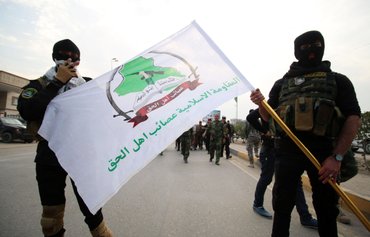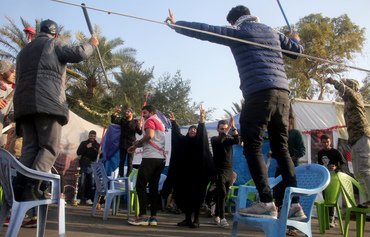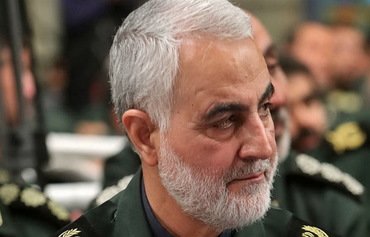With the killing of Islamic Revolutionary Guards Corps Quds Force (IRGC-QF) commander Qassem Soleimani, the man responsible for the loss of thousands of civilian lives and the instigator of wars and conflicts is now gone.
Soleimani's end was the natural outcome for one of the most violent figures in recent history, who played a central role in perpetuating the malignant Iranian agenda, observers said.
Soleimani, whose death on January 3rd left the world a safer place, they said, was the leader of the infamous Quds Force, but in terms of influence and prestige, he was the "oppressive arm" of Supreme Leader Ali Khamenei.
"While in command of the Quds Force, Soleimani was able to establish a network of terrorist groups serving as proxies for Iran's endeavour to dominate its neighbours, and he personally managed their operations and gave them orders," political analyst Alaa al-Nashou told Diyaruna.
![Iranian Quds Force Commander Qassem Soleimani was killed in a US drone attack near Baghdad airport on January 3rd. [Photo circulated online]](/cnmi_di/images/2020/02/14/22391-Qassem-Soleimani-Iraq-600_384.jpg)
Iranian Quds Force Commander Qassem Soleimani was killed in a US drone attack near Baghdad airport on January 3rd. [Photo circulated online]
Proxies execute Iran's orders
In Iraq, there are at least 60 armed militias, most of which were operating under Soleimani's command and were executing the goals of the Iranian regime, al-Nashou said.
At the forefront of these militias is Kataib Hizbullah, which was headed by Abu Mahdi al-Muhandis, Soleimani's friend who died with him alongside a few other militia members in the US air raid on their convoy near Baghdad Airport.
"Al-Muhandis publicly showed his loyalty to the Iranian regime and declared himself a soldier of Soleimani," al-Nashou said.
Other influential militias loyal to Iran in Iraq include Asaib Ahl al-Haq, Badr Organisation, Harakat al-Nujaba, Imam Ali Brigades and Saraya al-Khorasani.
While under Soleimani's command, these proxies were active in "instigating chaos and undermining civil peace by committing sectarian violence and physical assassinations of opponents of the Iranian regime".
Killing Iraqi protestors
"Most recently, they were responsible for suppressing and killing hundreds of Iraqi protestors with direct orders and planning from Soleimani," al-Nashou noted.
"These terrorist groups were also involved in attacks on diplomatic missions and international interests under Soleimani's direction, launching dozens of rocket attacks on the Green Zone in Baghdad, which is home to several embassies," he said.
Militia rockets also hit "Iraqi camps in the north and west of the country, where international coalition forces are in charge of training and supporting the Iraqi army", he added.
These actions "were not only a security threat but also a systematic attack on Iraqi sovereignty, endangering its interests and threatening its relations with its regional and international allies," al-Nashou said.
"Soleimani's departure was a severe blow to the Iranian regime and to the expansionist strategy it is sponsoring in the region," he said.
"The world is definitely safer and more stable now that he is gone."

![Quds Force commander Qassem Soleimani was directly responsible for Iran's proxies in the region and for thousands of civilian deaths at their hands. [Photo circulated online]](/cnmi_di/images/2020/02/14/22408-qassem-soleimani-proxies-600_384.jpg)






